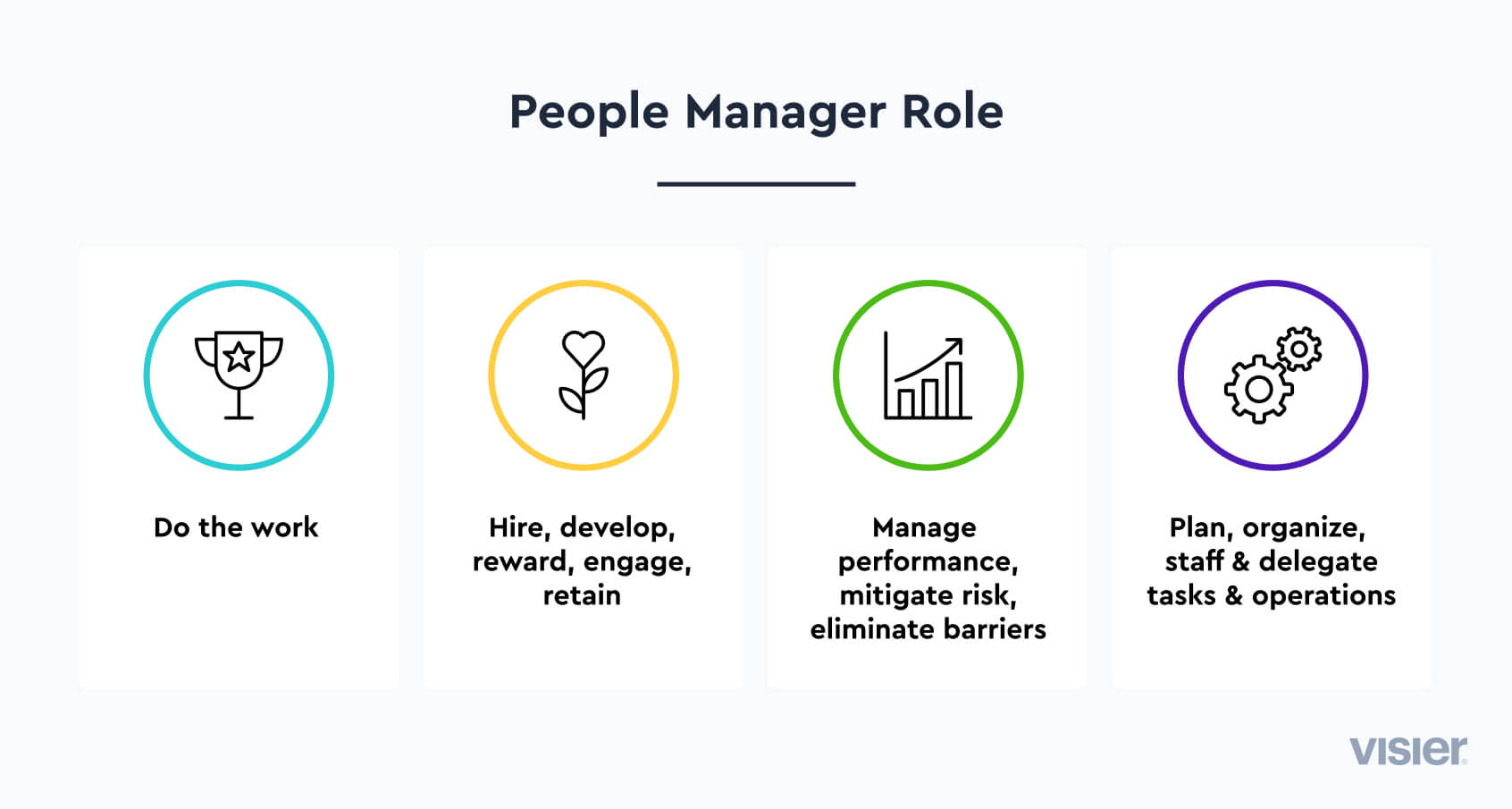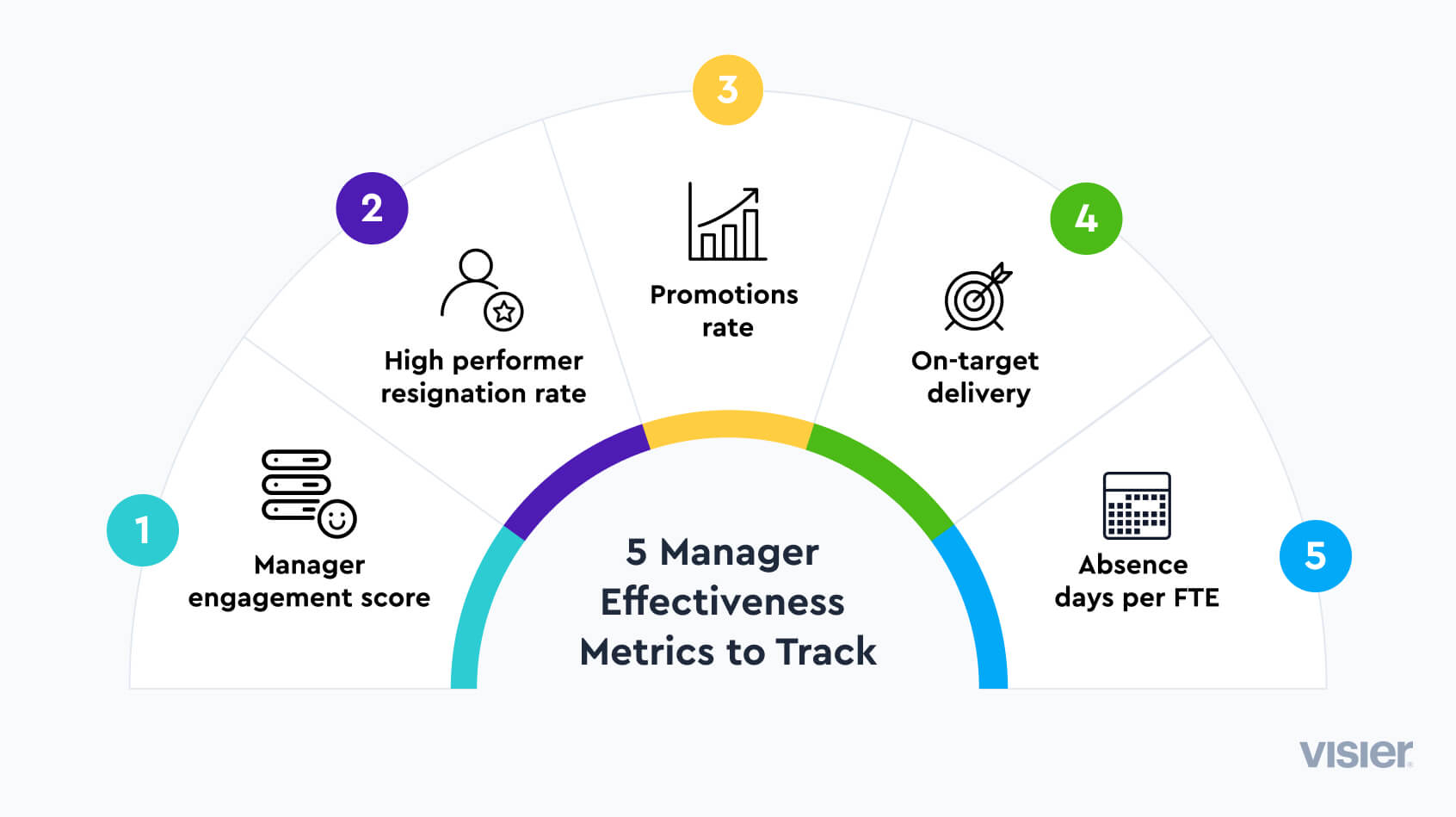PEOPLE ANALYTICS
Everything You Need To Know About Manager Effectiveness
Manager effectiveness means reaching company goals while supporting employees so that they can perform their best. It is the cornerstone of a thriving workplace ecosystem. Read this guide to learn more.
Take a self-guided tour
Table of contents
What is manager effectiveness?What is people management?How to improve manager effectivenessHow to measure manager effectiveness5 manager effectiveness metrics to trackEmpower managers to be more effective with people analyticsWhat is manager effectiveness?
Manager effectiveness means supporting and empowering employees, thus ensuring they are engaged, perform their best, and are happy in the workplace. In short, it means reaching company goals while keeping employee expectations in mind.
It includes several layers and skills, such as:
Leadership and communication skills. An effective manager needs strong leadership skills. Clear communication, positive relationships, feedback, and active listening are essential for good managers.
Decision-making. Managers need to make many decisions that can have a strong impact on their team. That’s why being able to analyze data and make informed decisions is critical for the well-being of the team and the company.
Adaptability. The business landscape changes at a rapid pace. You can’t have manager effectiveness without being adaptable and able to lead the team through any transitions.
Problem solving. No matter how carefully you plan things, it’s safe to assume problems will arise. An effective manager needs to analyze any issues at hand, find the root cause, and implement solutions quickly.

What is people management?
A people manager is someone in charge of a team or department who oversees people who carry out essential functions and responsibilities that allow the organization and its people to thrive.
Front-line people managers do the work of planning, organizing, and delegating work across the team. Additionally, they're responsible for hiring talent as well as coaching and developing employees. People managers are the first line of defense against turnover, champion employee engagement, and are in a critical position to mitigate risk and eliminate barriers.
All of this is done in support of fostering employee motivation, collaboration, engagement, and well-being so that employees experience role clarity, autonomy, purpose, and recognition.

How to improve manager effectiveness
Becoming an effective manager requires a combination of skills, traits, and tactics. Here are some tips to become a better leader.
1. Prioritize communicating with employees
Communication is crucial if you want a team that works well together and reaches its goals. You may think that communication refers only to how well you explain tasks and expectations to employees. While that is important, you’ll need to focus on the other side as well: listening.
An effective manager will be able to effectively communicate what needs to be done, but they also need to be equally as good listeners. Allow your team members to share their opinions. Ask for their feedback, show empathy, and ask follow-up questions when needed.
2. Reward top performers
Rewarding the best performers shows your team members that you see and value their efforts. Merit reward programs can improve job satisfaction, increase awareness, and reduce voluntary turnover.
Get creative with your rewards and adapt to your company’s budget. Sometimes, a merit increase or a bonus will be possible. You can also promote high performers or include them in a succession planning program.
Finally, if you’re working with a low budget, naming an employee of the month can be a simple, but still effective way to recognize their efforts.
3. Be transparent
Whether we’re talking about pay, merit rewards, or project and company goals, transparency is crucial. Without it, your employees may begin to feel dissatisfied and become disengaged.
Plus, if they don’t understand what is expected of them, productivity and performance can quickly drop. Transparency increases trust, and engagement, and helps everyone work at their peak capacity.
4. Lead by example
Expecting the best without giving your best is a strategy that will lead you to failure. Employees will strive to do their best, but in the long run, they might end up emulating their leader’s behavior. When you lead by example, you can foster a culture of accountability and respect. You can gain credibility and trust, and inspire employees to work hard to achieve their goals.

How to measure manager effectiveness
To get a good picture of manager effectiveness in your company, you’ll need to measure it from several different angles. Most companies talk about a manager effectiveness index which usually means tracking several metrics. But before analyzing exact numbers, there are a few other things you can do to gather insights.
360-degree feedback. This is a type of performance review in which you’ll gather feedback from multiple sources. These can include the person’s peers, subordinates, and superiors. The more varied your sources, the better understanding you can get of the manager’s effectiveness.
Objective achievement. Look at what goals a manager had and how many they achieved during a set period. There is one downside here. By looking at the objectives achieved, you’re not analyzing the big picture. You’re ignoring external factors that may have slowed down the progress, but that have nothing to do with manager effectiveness. If you choose to use this assessment, use another method or feedback technique as well, taking a holistic view.
Standard performance reviews. There’s no feedback from peers or subordinates involved in this type of review. Instead, the review is between the manager and their superior, and aims to look at strengths and areas for improvement. It is also an opportunity to set future goals and create plans for development.
5 manager effectiveness metrics to track
Beyond the various types of performance reviews or the objectives achieved, metrics provide a valuable, data-driven look at a manager's effectiveness. Here are a few you should track.

1. Manager effectiveness score
Effective managers make time to understand the needs of each employee on their team in order to best support them. This helps employees gain a sense of control over their work lives and promotes employee well-being.
Managers are the key link between the organization and the employee. They are not the only factor influencing employee engagement, but they are pivotal because of their opportunity to understand and support employee engagement at an individual level.
Most engagement survey processes have a specific series of questions that look at how employees view their supervisor. Understanding and using this score to build a complete view of manager effectiveness is important.
2. High performer resignation rate
You already know people are inclined to leave a company because of poor leadership. So if you see high turnover rates, especially if they’re only happening within one to two teams, there’s a chance ineffective management is the culprit.
When the high performer resignation rate is greater than the overall resignation rate, it signals a problem that needs to be addressed. If you’re losing high performers more quickly than your general employee base, this means your overall talent quality is reducing, which is likely to lead to productivity and quality challenges in the future.
3. Rate of promotions
Good leaders help to create more good leaders. That’s why effective managers are often linked to a high number of promotions. To measure if a manager is effective at developing talent, you need to understand how many of their people were promoted—both within their team and externally to another team. Look at your promotions actioned, which calculates the number of people who were promoted from a specific work group.
Don’t forget to look at this metric through the lens of the average promotion number within the company. Three advancements for a given period may sound like too little. But if the average number of promotions is also three or even less, that manager is doing better than the majority.
4. On-target delivery
The on-target delivery metric helps you evaluate how managers structure work on their teams, and how they adapt practices as projects and processes to support organizational goals as they evolve.
One overrun every once in a while isn’t necessarily a sign of ineffective management, but when delivery delays are common it's time to dig in deeper. Reoccurring delays can be an indicator that a manager is having difficulties guiding the employees, managing expectations, or setting effective strategies.
5. Absence days per full-time equivalent (FTE)
Voluntary turnover may show issues with management. But so can absenteeism. In fact, high absenteeism rates may precede a wave of resignations, so it’s always good to keep an eye on this number. An effective manager will help employees have a good work-life balance, prioritize their health, and avoid burnout, all of which should lower absenteeism.

Empower managers to be more effective with people analytics
Developing great leaders won’t happen overnight. You need to set goals and expectations, select the right people, and guide them toward success. Without first analyzing your employee data, all your work may be in vain. People analytics enhances your decision-making process by helping you see the data that matters. You’ll understand your employees and you’ll be able to select the very best for the leadership positions.
More importantly, putting people analytics and insights right into the hands of managers increases their effectiveness. When people managers have access to people insights about their direct reports and related benchmarks at the organizational level, they can take action and make critical decisions instantly, right in the moments that matter most.


